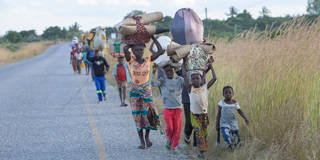An Islamic State-affiliated insurgency in Mozambique has displaced nearly a million people and undermined the country’s health-care system. Using the Global Fragility Act, the United States should collaborate with local partners to bolster public health, a strategy that will save lives and promote stability.
WASHINGTON, DC – Since 2017, Islamic State-affiliated insurgents have wreaked havoc on Mozambique. Terrorizing the northern province of Cabo Delgado, the militants have killed more than 6,500 people, ravaged infrastructure, recruited child soldiers, and committed sexual and gender-based violence. All told, the conflict has displaced nearly one million people.
The World Food Program Representative and Country Director for Mozambique has called the resulting humanitarian crisis a “catastrophe beyond epic proportions.” Chief among the challenges facing the population is reduced access to health care. The insurgency has forced the closure of nearly half of Cabo Delgado’s health centers. As thousands of Mozambicans move south to escape the violence, their basic health-care needs are straining the infrastructure in other provinces, thereby weakening the country’s overall health security.
The international response has been substantial: the United Nations has appealed for $437 million in humanitarian aid to address the massive internal displacement in northern Mozambique, and the United States, in particular, is funneling considerable resources into the country. In addition to the sizeable US development assistance allocated to Mozambique each year, USAID announced a plan last July to provide $116 million in supplemental aid – mostly for food and nutrition purposes, though some funds are intended to meet health-care needs.

WASHINGTON, DC – Since 2017, Islamic State-affiliated insurgents have wreaked havoc on Mozambique. Terrorizing the northern province of Cabo Delgado, the militants have killed more than 6,500 people, ravaged infrastructure, recruited child soldiers, and committed sexual and gender-based violence. All told, the conflict has displaced nearly one million people.
The World Food Program Representative and Country Director for Mozambique has called the resulting humanitarian crisis a “catastrophe beyond epic proportions.” Chief among the challenges facing the population is reduced access to health care. The insurgency has forced the closure of nearly half of Cabo Delgado’s health centers. As thousands of Mozambicans move south to escape the violence, their basic health-care needs are straining the infrastructure in other provinces, thereby weakening the country’s overall health security.
The international response has been substantial: the United Nations has appealed for $437 million in humanitarian aid to address the massive internal displacement in northern Mozambique, and the United States, in particular, is funneling considerable resources into the country. In addition to the sizeable US development assistance allocated to Mozambique each year, USAID announced a plan last July to provide $116 million in supplemental aid – mostly for food and nutrition purposes, though some funds are intended to meet health-care needs.